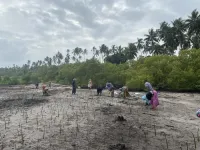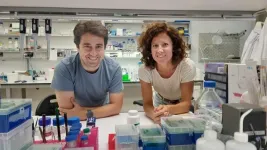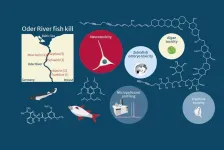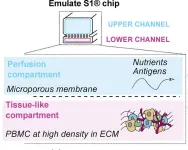(Press-News.org) Conservation needs to scale successfully to protect nature. A new paper takes lessons from around the world to show how that might be done.
To reverse biodiversity loss and meet ambitious global targets, conservation programmes designed to preserve everything from forests to fish need to work ‘at scale’.
Scaling can mean three things. Scaling ‘out’ means expanding a programme to new people and places, while scaling ‘up’ means bringing in higher-level institutions, such as governments introducing policies or incentives that make it easier for individuals and private companies to engage.
Scaling ‘deep’ means changing hearts and minds – what is socially acceptable. A particularly good example of scaling deep is the ‘Don’t Mess with Texas’ campaign in the 1980s, which successfully made littering a social no-no.
But not every attempt to expand pilot programmes in one or more of these directions works. Now, the Catalysing Conservation team led by Dr Morena Mills at Imperial College London researchers have reviewed conservation initiatives around the world with global experts and come up with five lessons to avoid the pitfalls of ineffective expansion.
The study is published today in Nature Ecology & Evolution, and we spoke to two of the authors on the paper, Dr Thomas Pienkowski and Dr Matthew Clark, both from the Centre for Environmental Policy at Imperial.
Before we dive in, Dr Clark says: “There’s no magic bullet – it’s not a case of ‘do these five things and you will succeed’ – but we hope these lessons will allow reflection on what hasn’t worked, and where we need to go from here.”
Lesson 1: There must be a balance between what is effective and what is scalable
Say you have a pilot programme that works with coastal communities to protect fish and other marine resources, aiming to improve the local ecology and economy. Then lots of neighbouring communities take up the programme. Great! This is scaling out, but has it actually been effective? Did it meet the stated goals of protecting marine life and improving local livelihoods? If the answer is no, it has scaled but it is not effective.
Conversely, something can be effective but not scalable. Dr Clark works with communities to support mangrove conservation, which can involve planting programmes. However, many of the seedlings die young. It’s possible to use specialised tools and know-how to increase survival rates, which makes the planting more effective, but it is an intensive process, and so not very scalable across rural communities.
The team say these trade-offs between what’s scalable and what’s effective must be balanced.
Good example: Community-based forestry management in Nepal has been adopted for more than 20,000 forests since the 1980s and appears to have reduced both poverty and deforestation, showing that some initiatives can be both highly scalable and effective.
Lesson 2: Effectiveness can depend on scale
A pilot project that is successful in one area may not work when moved out to a new area. This is common, say the researchers, and can be for a number of reasons: pilots may be in optimal locations and have lots of oversight and investment that expanded programmes won’t have, for example.
But it can also work the other way. For example, says Dr Clark: “Where the goal is to protect land for wildlife, larger animals that move over larger areas will only benefit once enough land is conserved, and enough patrols are in place to enforce the protection.”
Good example: Cacao agroforestry in Belize became much more effective at scale when a clear market for sustainable cacao emerged and more international companies wanted to promote their use of these products.
Lesson 3: The effects of conservation can change the conditions for further conservation
Sometimes, conservation expansion can backfire even when it’s effective. For example, a 10-year project in Mozambique introduced ‘no-take’ zones for fish and mangrove timber, which increased food security. However, once these areas had regained their value as sources of food and income, conservation support declined, leading to the abandonment of the zones in some areas.
These kinds of feedback loops between environmental change and human behaviour can be negative, as in Mozambique, or positive, where the impact of conservation schemes in one area can lead to neighbouring areas taking them up spontaneously, or where grassroots actions become national policy.
Good example: on the island of Pemba, Zanzibar, protected forest areas initially led to more harvesting on the edges of these zones; but this in turn led to neighbouring communities applying for their own forest protection, spontaneously expanding conversation.
Lesson 4: Pressures to scale can lead to bad practices that undermine long-term outcomes
Ambition is needed to meet ambitious goals, but ambition without care can be harmful. Dr Pienkowski explains one way this can happen: “NGOs [non-governmental organisations] play a really important role in scaling out, providing technical and financial support to local communities. But there can also be blurred boundaries between assistance and coercion.
“This can take the form, for example, of NGOs misleading communities of the benefits they might get from engaging in conservation programmes, or only engaging with people in the community who are most likely to benefit, leaving more vulnerable members behind and widening inequalities.”
For example, the REDD+ scheme is designed to help developing countries manage their forests and improve carbon stocks, but its implementation in parts of Tanzania was marred by promised payments not materialising, leading people to abandon conservation efforts and be suspicious of other schemes.
Larger NGOs are often needed to scale programmes, but this can be at the expense of local knowledge and grassroots organisations. For example, ‘slash and burn’ agriculture is considered bad practice in Europe, so European NGOs may lobby against it, but in communities in Africa it can be well used and an integral part of local ecosystem management.
Good example: Eco-tourism in Costa Rica started locally with support from NGOs, but has now become self-sustaining, meaning it no longer relies on direct aid or other structures that may undermine its long-term success.
Lesson 5: More evidence is needed
Dr Pienkowski explains: “This one is really an appeal from us researchers, who are struggling to develop the evidence base we need to inform more effective scaling strategies. It’s very difficult to know which initiatives have gone to scale or not – this information isn’t collected in a systematic or rigorous way.”
This is particularly true after programmes have ‘ended’ – few NGOs routinely review whether a scheme is still working years after their intervention has ended, or whether it has been abandoned.
Dr Pienkowski concludes: “For those calling for conservation scaling, this is a valuable moment to pause and reflect: with these examples and these lessons, what do we need to change? If we do this, we’re more likely to be able to deliver impact at scale and finally bend the curve on biodiversity loss.”
END
5 lessons to level up conservation successfully
2024-09-06
ELSE PRESS RELEASES FROM THIS DATE:
Researchers advance new class of quantum critical metal that could advance electronic devices
2024-09-06
A new study led by Rice University’s Qimiao Si has unveiled a new class of quantum critical metal, shedding light on the intricate interactions of electrons within quantum materials. Published in Physical Review Letters on Sept. 6, the research explores the effects of Kondo coupling and chiral spin liquids within specific lattice structures.
“The insights gained from this discovery could lead to the development of electronic devices with extreme sensitivity, driven by the unique properties of quantum-critical ...
DOE, ORNL announce opportunity to define the future of high-performance computing
2024-09-06
The U.S. Department of Energy’s (DOE) Office of Science (SC) today announced a new research and development opportunity led by Oak Ridge National Laboratory (ORNL) to advance technologies and drive new capabilities for future supercomputers. This industry research program worth $23 million, called New Frontiers, will initiate partnerships with multiple companies to accelerate the R&D of critical technologies with renewed emphasis on energy efficiency for the next generation of post-exascale computing in the 2029 ...
Cannabidiol demonstrated to alleviate symptoms of Leigh syndrome
2024-09-06
A study led by the UAB Institut de Neurociències and published in the journal Nature Communications demonstrates in animal models how daily administration of cannabidiol (CBD), a substance obtained from the cannabis plant, extends lifespan and improves symptoms associated with Leigh syndrome. This severe mitochondrial disease affecting children is characterised by a progressive decline in cognitive and motor functions and premature death. The research group also demonstrated in both mice and fibroblasts from children with ...
A chemical cocktail of micropollutants amplified the effect of algal toxins causing mass fish mortality on the River Oder in 2022
2024-09-06
Summer 2022’s environmental disaster led to the death of up to 60 per cent of fish biomass and up to 85 per cent of mussel and snail biomass in the River Oder. In August 2022, the UFZ set up an interdisciplinary ad hoc working group together with researchers from the Leibniz Institute of Freshwater Ecology and Inland Fisheries (IGB), the University of Veterinary Medicine, Vienna (Vetmeduni) and the University of Birmingham. They took water samples at five locations along the Oder, extracted poisoned ...
Generative AI in cancer imaging: revolutionizing detection & diagnosis
2024-09-06
“This editorial explores its impact on expanding datasets, improving image quality, and enabling predictive oncology.”
BUFFALO, NY- September 6, 2024 – A new editorial was published in Oncotarget's Volume 15 on September 4, 2024, entitled, “Generative AI in oncological imaging: Revolutionizing cancer detection and diagnosis.”
Generative AI is revolutionizing oncological imaging, enhancing cancer detection and diagnosis. This editorial explores its impact on expanding ...
Disparity in access to medications for opioid use disorder persist in criminal legal settings
2024-09-06
EMBARGOED FOR RELEASE UNTIL 11 A.M. ET FRIDAY, SEPTEMBER 6. 2024
Individuals involved in the criminal legal system have a high rate of opioid use disorder (OUD) and a high risk of overdose death compared to the general population, yet the most effective treatments—medications for opioid use disorder (MOUD)—are underutilized in criminal legal settings where treatment is mandated as part of a person’s probation or parole. Medications are often not provided due to stigma or lack of adequate funding for evidence-based care. According to a study ...
Age-related changes in male fibroblasts increase treatment-resistant melanoma
2024-09-06
Age-related changes in the fibroblasts, cells that create the skin’s structure, contribute to the development of aggressive, treatment-resistant melanoma in males, according to research in mice by the Johns Hopkins Kimmel Cancer Center.
The study was published online Sept. 6 in Cell.
The risk of developing melanoma, a potentially deadly skin cancer, increases with age. Men are more at risk than women, and tend to develop more aggressive, hard-to-treat melanomas, particularly at advanced ages, says Ashani Weeraratna, Ph.D., the Bloomberg ...
COVID-19 and rates of cancer diagnosis in the US
2024-09-06
About The Study: This population-based cross-sectional study of U.S. cancer incidence trends found that rates of diagnosis improved in 2021 but continued to be lower than expected, adding to the existing deficit of diagnosed cases from 2020. Particular attention should be directed at strategies to immediately increase cancer screenings to make up lost ground.
Corresponding Author: To contact the corresponding author, Krystle A. Lang Kuhs, PhD, MPH, email krystle.kuhs@uky.edu.
To access the embargoed study: Visit our For The Media website at this link https://media.jamanetwork.com/
(doi:10.1001/jamanetworkopen.2024.32288)
Editor’s Note: Please see ...
New research from Swansea University shines a light on how solar power and farming can coexist
2024-09-06
Scientists from Swansea University have developed a new tool to help identify optimal photovoltaic (PV) materials capable of maximising crop growth while generating solar power.
In a recent study published in Solar RRL, academics from the University’s Department of Physics have been exploring the effect of semi-transparent PV materials placed over crops – an exemplary application of agrivoltaics (solar panels combined with agricultural settings).
As part of this work, the team has developed an innovative freeware tool that predicts the light transmission, absorption, and power generation of different PV materials nearly anywhere on the globe using ...
Artificial lymphoid organs could help predict efficacy of booster vaccines
2024-09-06
Researchers at the Institut Pasteur in France have developed artificial “lymphoid organ-chips” that recreate much of the human immune system’s response to booster vaccines. The technology, described in an article to be published September 6 in the Journal of Experimental Medicine (JEM), could potentially be used to evaluate the likely effectiveness of new protein and mRNA-based booster vaccines for COVID-19 and other infectious diseases.
The rapid mutation and evolution of SARS-CoV-2 and other viruses ...








